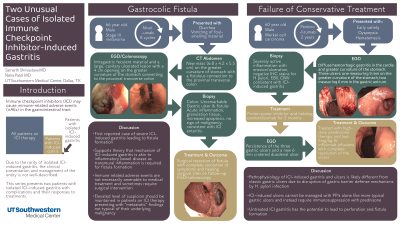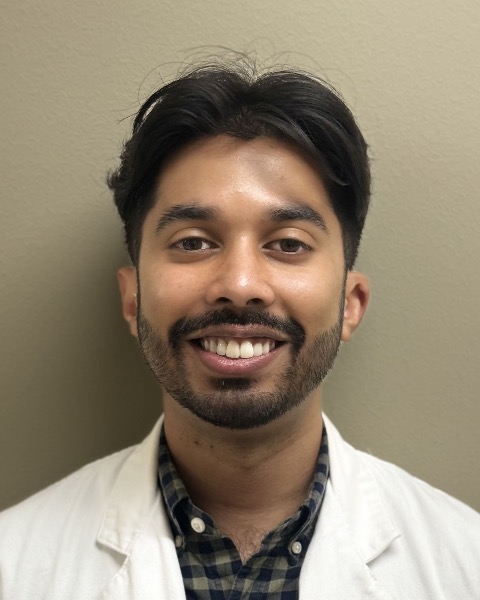Tuesday Poster Session
Category: Stomach
P4232 - Two Unusual Cases of Isolated Immune Checkpoint Inhibitor-Induced Gastritis
Tuesday, October 24, 2023
10:30 AM - 4:00 PM PT
Location: Exhibit Hall

Has Audio

Samarth Shrivastava, MD
University of Texas Southwestern Medical Center
Dallas, TX
Presenting Author(s)
Samarth Shrivastava, MD, Neha Patel, MD
University of Texas Southwestern Medical Center, Dallas, TX
Introduction: Immune checkpoint inhibitors (ICIs) may lead to immune-related adverse events (irAEs) in the gastrointestinal tract. Although ICI-induced colitis and diarrhea are well-documented, irAEs localized to the stomach are less frequently described. The management of most irAEs is suspension of ICI therapy and immune suppression; as only 0.2% of patients receiving ICIs have isolated ICI-induced gastritis, this is not well-documented in this population. This series presents two patients with isolated ICI-induced gastritis with complications and their responses to treatments.
Case Description/Methods: First, a 66-year-old male presented with stage III melanoma requiring nivolumab. After 8 cycles of therapy, he complained of diarrhea and vomiting of foul-smelling material. EGD and colonoscopy revealed an ulcerated fistula from the stomach to the colon with histology consistent with ICI-induced gastritis. After surgical resection, his symptoms completely resolved without immunosuppression. Second, a 60-year-old male presented with metastatic Merkel cell carcinoma requiring pembrolizumab. After two years of treatment, he endorsed early satiety and dyspepsia, with EGD revealing ICI-induced diffuse hemorrhagic gastritis and large ulcers (Figure 1). Conservative measures with a proton pump inhibitor and suspending pembrolizumab failed, with improvement only after several weeks of high-dose steroids and infliximab infusion.
Discussion: The first case describes an entirely novel entity: ICI-induced gastrocolic fistulation. The mechanism of ICI-induced gastritis is unclear but is theorized to be like inflammatory bowel disease. Transmural inflammation, a hallmark of Crohn’s disease, is required for fistula formation, suggesting a similar mechanism in ICI-induced gastritis. This case shows that immunosuppression is not always helpful for irAEs; our patient required surgical intervention. The second case highlights the effect of conservative management of ICI-induced gastritis. A conservative approach may be favored with irAEs by withholding ICI therapy and avoiding corticosteroids. Our patient’s hemorrhagic gastritis/ulcers were initially managed unsuccessfully with PPI and suspension of ICI therapy but required significant immunosuppression. This suggests the pathophysiology of ICI-induced ulcers is different from gastric ulcers due to disruption of barrier defense by H. pylori, nonsteroidal anti-inflammatory medications, and acid hypersecretion.

Disclosures:
Samarth Shrivastava, MD, Neha Patel, MD. P4232 - Two Unusual Cases of Isolated Immune Checkpoint Inhibitor-Induced Gastritis, ACG 2023 Annual Scientific Meeting Abstracts. Vancouver, BC, Canada: American College of Gastroenterology.
University of Texas Southwestern Medical Center, Dallas, TX
Introduction: Immune checkpoint inhibitors (ICIs) may lead to immune-related adverse events (irAEs) in the gastrointestinal tract. Although ICI-induced colitis and diarrhea are well-documented, irAEs localized to the stomach are less frequently described. The management of most irAEs is suspension of ICI therapy and immune suppression; as only 0.2% of patients receiving ICIs have isolated ICI-induced gastritis, this is not well-documented in this population. This series presents two patients with isolated ICI-induced gastritis with complications and their responses to treatments.
Case Description/Methods: First, a 66-year-old male presented with stage III melanoma requiring nivolumab. After 8 cycles of therapy, he complained of diarrhea and vomiting of foul-smelling material. EGD and colonoscopy revealed an ulcerated fistula from the stomach to the colon with histology consistent with ICI-induced gastritis. After surgical resection, his symptoms completely resolved without immunosuppression. Second, a 60-year-old male presented with metastatic Merkel cell carcinoma requiring pembrolizumab. After two years of treatment, he endorsed early satiety and dyspepsia, with EGD revealing ICI-induced diffuse hemorrhagic gastritis and large ulcers (Figure 1). Conservative measures with a proton pump inhibitor and suspending pembrolizumab failed, with improvement only after several weeks of high-dose steroids and infliximab infusion.
Discussion: The first case describes an entirely novel entity: ICI-induced gastrocolic fistulation. The mechanism of ICI-induced gastritis is unclear but is theorized to be like inflammatory bowel disease. Transmural inflammation, a hallmark of Crohn’s disease, is required for fistula formation, suggesting a similar mechanism in ICI-induced gastritis. This case shows that immunosuppression is not always helpful for irAEs; our patient required surgical intervention. The second case highlights the effect of conservative management of ICI-induced gastritis. A conservative approach may be favored with irAEs by withholding ICI therapy and avoiding corticosteroids. Our patient’s hemorrhagic gastritis/ulcers were initially managed unsuccessfully with PPI and suspension of ICI therapy but required significant immunosuppression. This suggests the pathophysiology of ICI-induced ulcers is different from gastric ulcers due to disruption of barrier defense by H. pylori, nonsteroidal anti-inflammatory medications, and acid hypersecretion.

Figure: Figure 1. EGD revealed diffuse hemorrhagic gastritis in the cardia and greater curvature of the stomach. Three ulcers were noted. Pictured is the largest: a 9 mm ulcer on the greater curvature of the stomach,
Disclosures:
Samarth Shrivastava indicated no relevant financial relationships.
Neha Patel indicated no relevant financial relationships.
Samarth Shrivastava, MD, Neha Patel, MD. P4232 - Two Unusual Cases of Isolated Immune Checkpoint Inhibitor-Induced Gastritis, ACG 2023 Annual Scientific Meeting Abstracts. Vancouver, BC, Canada: American College of Gastroenterology.
